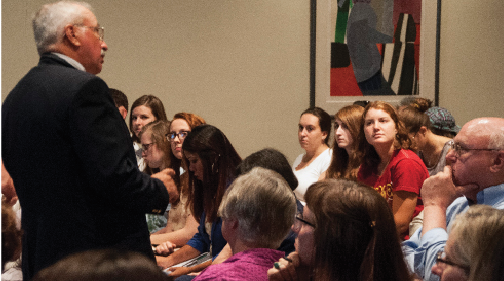Col. Talks ISIS Threat

Dr. Núñez illustrates American policy failures in Iraq
U.S. Army Colonel Joseph R. Núñez discussed possible policy changes in reaction to ISIS activity. The Clarke Forum sponsored speech entitled “ISIS in Iraq: What are our options?” was held in the Stern Center. ISIS, or the Islamic State of Iraq and Syria, is a militant offshoot of Al Qaeda in Syria. The group came to national attention in June, when they overran Mosul, Iraq, which is the country’s second largest city.
The central point of his speech focused on what the U.S. should do about ISIS. His points included arming the Kurds, clamping down on corruption among military and civilian leadership, increasing aid to local provinces and towns, minimizing the use of contractors and increasing air support, surveillance and intelligence operations. He also discussed the idea of retraining the Iraqi Army. ISIS has taken over much of Northern Iraq and Eastern Syria. After U.S. interests and religious minorities in the region were threatened, the U.S. intervened in August with targeted airstrikes and humanitarian aid. Recently, the beheadings of hostages have outraged foreign governments, and President Obama gave a speech last Wednesday outlining his plan for ISIS.
Colonel Núñez also discussed his military service in Iraq. A former instructor at the U.S. Army War College and West Point, Colonel Núñez spent 3 decades in the military. His service lasted from 2007-2013, where he spent time in various advising capacities all around the country.
Colonel Núñez begun with a top ten of Iraq in the style of David Letterman. His main points included that invading Iraq in the first place was a “strategic blunder,” that disbanding the Iraqi Army shortly after the invasion was a mistake, that a more earnest effort should have been made to keep American troops in Iraq past 2011 and that Iraq has yet to function as a democracy.
Both students and faculty found Núñez’s talk to be highly informative. Shawn Cremer ’18 called it an “easily accessible presentation to those not fully aware of what was going on.” Sydney Collins ’18 agreed, stating that “his actual experience on the ground validated the presentation.” Professor Edward Webb, Assistant Professor of Political Science and International Studies, offered his take, saying the talk was a “valuable addition to hear from someone with firsthand.





